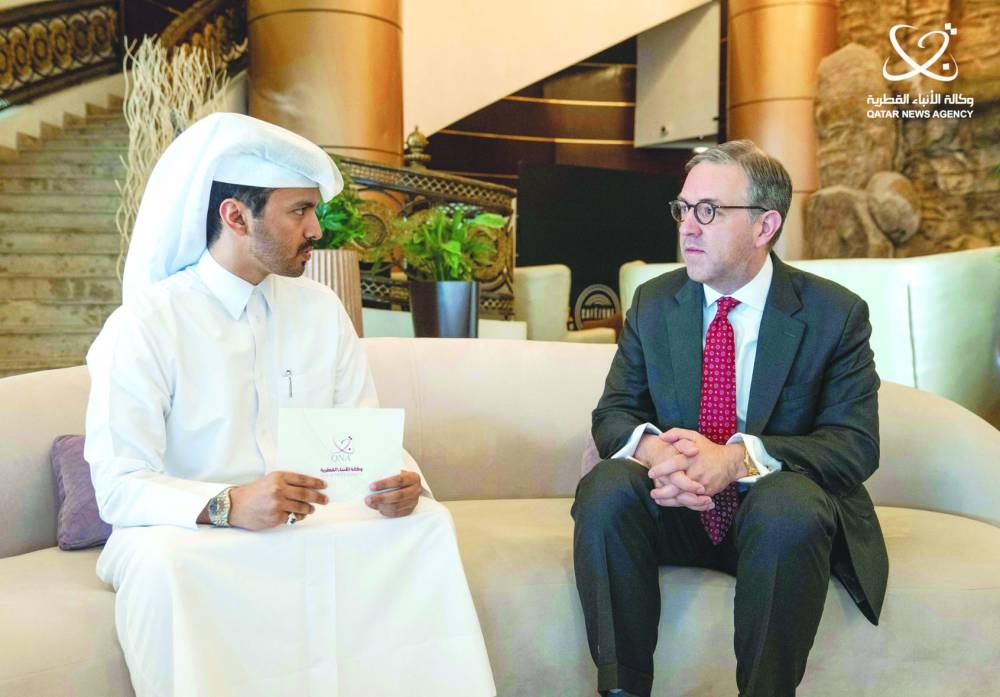President of the Hungarian Institute of International Affairs (HIIA), Gladden Pappin, affirmed that the cooperation between his country and the State of Qatar has recently witnessed great development and various forms, thanks to the common desire to strengthen bilateral relations.
Talking to Qatar News Agency (QNA), Pappin said that the relationship between Hungary and Qatar is strong and getting stronger. Last year saw visits of Prime Minister Orbn to Doha, as well as a visit of the Emir of Qatar to Budapest; the Hungarian president and foreign minister also visited Doha.
This cooperation has taken several forms, principally with the signing of agreements on energy as well as in agriculture, water management and diplomatic training, he said adding that at a more strategic level, both Hungary and Qatar are trying to navigate complicated international environments, and both play a positive role in advocating for the peaceful resolution of conflicts.
In this respect, Pappin lauded the State of Qatar's role as a mediator to resolve regional and international disputes.
"Hungary has been consistently grateful for this mediating role played by Qatar, which Hungary recognizes as important to avoiding the growth of additional conflicts in the region. Hungary has been a consistent voice in favor of de-escalation and promoting dialogue among all parties, and this has been substantiated in several elements of Hungary's relationship with Qatar over the last months," he said.
He went on saying: " The strong bilateral relationship between Hungary and Qatar has continued, particularly with regard to the release of three hostages with Hungarian citizenship. While the developments in Gaza have complicated the international environment considerably, Hungary has been able to increase its humanitarian assistance to the region, particularly through our 'Hungary Helps' program. To be sure, some European and Middle Eastern countries have different views on the situation in Gaza as well as the eventual direction of the peace process, in this respect Hungary and Qatar have continued their cooperation, emphasizing the ongoing development of bilateral relations as well as their interest in peace and stability."
Pappin affirmed that both Hungary and Qatar are advocating for peace in their respective regions while exhibiting a foreign policy increasingly followed by smaller yet significant countries making productive agreements with many foreign partners, even when those partners may disagree or diverge on other matters. The "connectivity" strategy that Hungary has been pursuing has strengthened our economic position within Europe, making Hungary an attractive destination for foreign investment.
"The numerous political agreements between Hungary and Qatar will be substantiated further in the coming years, as LNG will be available for delivery to Hungary beginning in 2027; and, during Hungary's presidency of the Council of the EU in the second half of this year, it will also be an opportunity for strengthening relations between the EU and Qatar," he stressed.
About his visit to Qatar, Pappin said that the Hungarian Institute of International Affairs, which he leads, seeks to be a bridge for exchange of Hungarian and Qatari perspectives on geopolitics and international relations.
"As a research institute attached to the Prime Minister's Office and now in its fifty-first year, HIIA seeks to advise the prime minister of Hungary on matters of strategic importance from questions of how stability and peace in the Middle East impact Hungarian interests, to larger questions of the global political order is shifting. We seek to make partnerships and exchanges with like-minded institutes in order to foster better mutual understanding and contribute to shared goals of connectivity and peace," he said.
Pappin said that during his stay in Doha, he would be visiting the Diplomatic Institute, which recently concluded an agreement with the Hungarian Diplomatic Academy. "As a strategic research institute with some training initiatives as well, the Hungarian Institute of International Affairs is developing networks for the exchange of research materials principally on questions of geostrategy, as well as bilateral and regional issues," he said.
President of the Hungarian Institute of International Affairs, said that the HIIA has built a number of international forums that provide a platform for exchange on regional and global events. These are principally our annual Budapest Balkans Forum (held every March), which draws high-level participants from throughout the Western Balkans; and our soon-to-be-announced East-West Summit, whose goal is to emphasize the importance of connectivity as opposed to bloc formation.
Qatar
HIIA President to QNA: Doha, Budapest Common Desire to Strengthen Bilateral Relations Contributed to Boosting Bilateral Cooperation*

